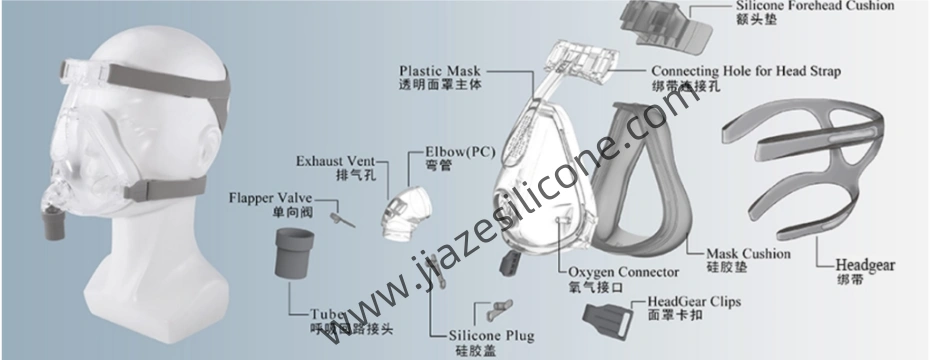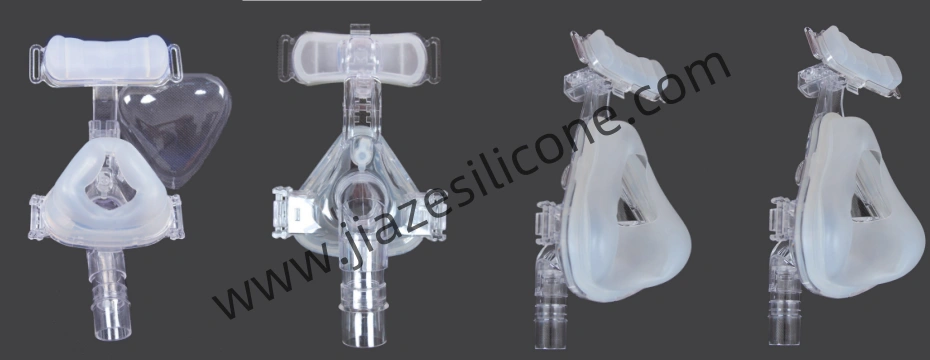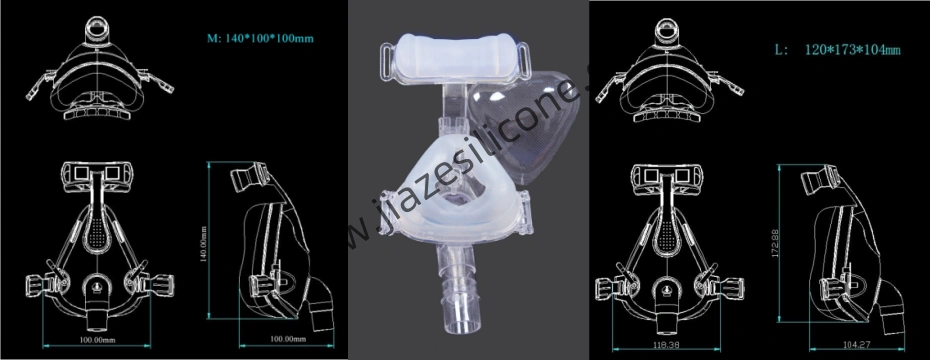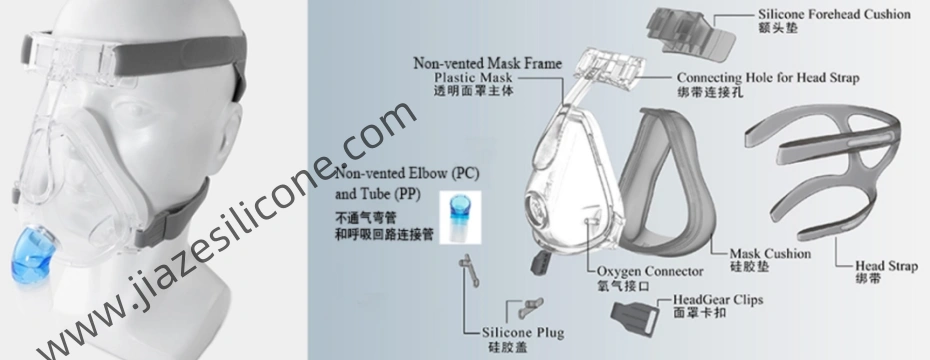The full face CPAP silicone mask is also known as a full-face CPAP mask for side sleepers and a Full face CPAP mask for beards.
Choosing the right CPAP (Continuous Positive Airway Pressure) mask is crucial for ensuring effective therapy for sleep apnea. When selecting a full-face CPAP mask with nasal pillows, it’s important to understand the design, your personal needs, and other relevant factors. Here’s a comprehensive guide to help you make better choices.
Understanding Full-Face Masks and Nasal Pillows

Silicone Full-Face CPAP Masks
- These masks cover both the nose and mouth, making them ideal for individuals who breathe through their mouth during sleep or have nasal blockages.
- They are suitable for users with higher CPAP pressure needs since the mask ensures a tight seal to prevent air leaks.
- Full-face masks provide broader coverage, which can feel more secure for some but might be bulkier than other types.
Nasal Pillow Masks
- Nasal pillow masks sit directly under the nostrils and deliver air through small cushions or “pillows.”
- These masks are minimalistic and lightweight, providing a less intrusive option.
- They’re ideal for users who prefer less coverage and do not have issues with mouth breathing during sleep.
Hybrid Masks
- A hybrid mask combines features of both full-face masks and nasal pillows. It covers the mouth like a full-face mask but uses nasal pillows for nasal airflow.
- These are perfect for users who like the freedom of nasal pillows but require mouth coverage due to mouth breathing.
Key Factors to Consider

1. Comfort
- Fit and Cushioning: The mask should sit comfortably on your face without pressing too hard. Look for soft, high-quality materials like silicone, memory foam, or gel for a snug fit.
- Skin Sensitivity: Choose hypoallergenic materials if you have sensitive skin to avoid irritation.
2. Breathing Habits
- If you breathe through your mouth, a full-face mask or hybrid mask is necessary to ensure effective therapy.
- If you’re primarily a nasal breather but occasionally mouth-breathe, consider pairing a nasal pillow mask with a chin strap.
3. Sleep Position
- Side Sleepers: Opt for masks with a low-profile design to prevent displacement or leaks while sleeping on your side.
- Back Sleepers: Most full-face and hybrid masks work well in this position as there’s minimal pressure on the mask.
- Stomach Sleepers: Minimalist designs like nasal pillows are better for stomach sleepers to reduce discomfort.
4. Seal and Fit
- A good seal is crucial to prevent air leaks. Masks come in various sizes; choose one that aligns with the structure of your nose, face, and mouth.
- Many CPAP masks offer adjustable headgear and cushion sizes to customize the fit.
5. CPAP Pressure Settings
- High CPAP pressures may require a full-face mask as it provides a better seal and ensures airflow without leaks.
- Nasal pillows are more comfortable in lower to moderate-pressure settings.
6. Ease of Use and Maintenance
- Select a mask with easily detachable parts for cleaning and maintenance.
- Hybrid masks with fewer parts are often more user-friendly.
7. Noise Levels
- Modern CPAP masks are designed with quiet exhalation ports to minimize noise. Ensure the mask you choose doesn’t disrupt your sleep or that of your partner.
8. Cost and Insurance Coverage
- Masks vary in price depending on their design, materials, and features. Check your insurance coverage to see which types are included.
- While it’s tempting to go for cheaper options, prioritize quality and durability for long-term use.
Steps to Select the Right full Face CPAP silicone mask

Step 1: Determine Your Needs
- Identify your breathing pattern during sleep (mouth vs. nasal breathing).
- Consider any existing facial issues like sensitive skin, facial hair, or anatomical features (e.g., prominent nose bridge).
Step 2: Try Different Mask Styles
- Visit a CPAP provider or sleep clinic where you can test different mask styles and sizes.
- Pay attention to how each mask feels on your face and its ease of adjustment.
Step 3: Adjust for Comfort
- Experiment with adjustable straps and cushion sizes to find a snug fit.
- Ensure the mask doesn’t leave red marks or cause discomfort, even after wearing it for a few hours.
Step 4: Consult Your Sleep Specialist
- Share your preferences and concerns with your sleep specialist or CPAP supplier.
- They can recommend specific brands and models suited to your therapy requirements.
Step 5: Check Return Policies
- Many suppliers offer trial periods or return options. Use these opportunities to ensure the mask works well for you at home.
Top Tips for First-Time Buyers
- Start Simple: If you’re new to CPAP therapy, start with a basic hybrid or full-face mask and upgrade based on your comfort and therapy progress.
- Consider a Heated Tube: Heated tubing can reduce dryness in nasal and oral passages, especially when using nasal pillows.
- Account for Facial Hair: If you have a beard or mustache, opt for a mask that accommodates facial hair without compromising the seal.
- Plan for Travel: If you travel frequently, consider a lightweight, compact mask with minimal parts.
Popular Brands and Models

Several reputable brands offer high-quality full-face masks with nasal pillows or hybrid designs:
- ResMed AirFit F30
- A full-face hybrid mask with a compact design and nasal cushions.
- Features QuietAir vent technology for minimal noise.
- Philips Respironics DreamWear Full Face
- Innovative design with under-nose cushions and mouth coverage.
- Offers excellent flexibility for side sleepers.
- Fisher & Paykel Vitera
- Full-face mask with RollFit XT cushion for maximum comfort and reduced pressure points.
- Designed for stability even with high-pressure settings.
- ResMed Mirage Liberty
- Combines a full-face mask with nasal pillows for versatile coverage.
- Adjustable headgear ensures a secure fit.
Final Thoughts
Choosing the right silicone full-face CPAP mask with nasal pillows requires balancing personal comfort, therapy needs, and mask features. Take your time to explore different options, consult with professionals, and test-fit masks to ensure the best experience. A well-chosen mask not only improves your sleep quality but also ensures adherence to CPAP therapy, which is essential for managing sleep apnea effectively.